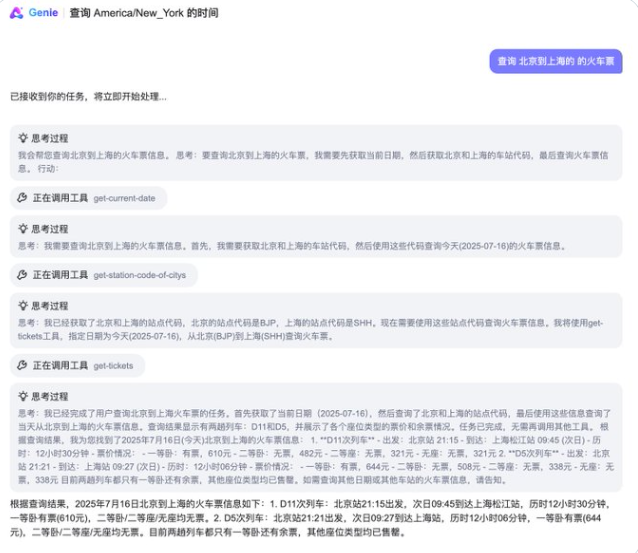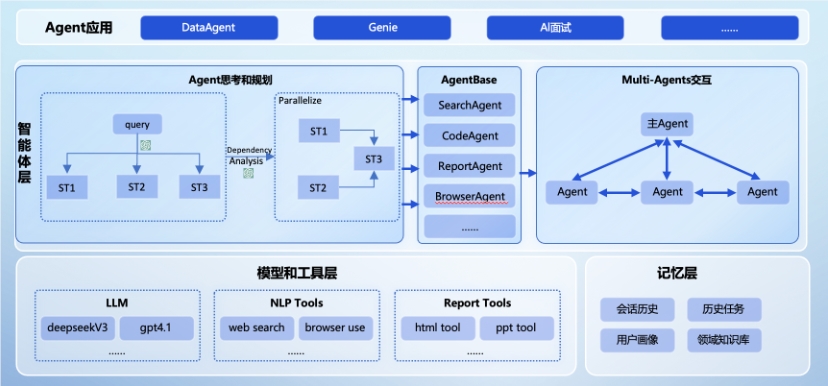The AI landscape is rapidly evolving, with京东's JoyAgent-JDGenie emerging as a trailblazer in the field of multi-agent systems. This product-level, end-to-end system has set a new benchmark in the GAIA standard tests, outperforming competitors like OWL and OpenManus with a remarkable accuracy rate of 75.15%. JoyAgent-JDGenie's prowess in handling complex tasks with its multi-agent collaboration capabilities and ready-to-use features positions it as a powerful tool for developers looking to rapidly build AI applications.


Setting the Bar High with GAIA Benchmarks
JoyAgent-JDGenie's performance in the GAIA benchmarks is nothing short of impressive. It has shattered previous records with an overall accuracy of 75.15%, demonstrating exceptional capabilities across varying levels of difficulty. In Level 1 tasks, it achieved over 85% accuracy, nearly 78% in Level 2 tasks, and an impressive 55% in the most challenging Level 3 tasks, significantly surpassing other open-source frameworks. The GAIA benchmark is recognized as the "gold standard" for evaluating AI agents due to its emphasis on real-world tasks, including multimodal processing, tool usage, and complex reasoning. JoyAgent-JDGenie's high scores underscore its potential in general scenarios.
An End-to-End Multi-Agent Framework Ready for Action
JoyAgent-JDGenie is a comprehensive end-to-end multi-agent system that allows users to directly obtain answers or solutions through simple queries or task inputs. The framework integrates front-end, back-end, core engines, and multiple sub-agent modules, including report generation, code, PPT, and file agents, covering a wide range of scenarios from document processing to code generation and presentation creation. Developers can further expand functionality by mounting custom sub-agents or external tools, such as web search APIs or Python interpreters, to meet specific business needs.
Unlike traditional single-agent systems, JoyAgent-JDGenie employs a multi-level collaboration design, efficiently handling complex tasks through task decomposition and agent collaboration. For instance, when a user inputs "generate a PPT on AI trends in 2025," the system automatically assigns tasks to PPT and data analysis agents, creating a presentation complete with charts and content. This ready-to-use feature significantly lowers the barrier to development, making it suitable for enterprises to quickly deploy AI applications.
Multimodal and Memory Optimization: A Smarter Leap Forward
The multimodal and memory design of JoyAgent-JDGenie is at its core. The system supports various input and output formats, including text, images, and code, capable of handling multimodal tasks in the GAIA benchmark, such as parsing PDF files, analyzing image content, or processing audio data. Additionally, the framework introduces a cross-task-level similar task memory mechanism, allowing the system to optimize the processing efficiency of current tasks based on historical task records. For example, when repeatedly generating similar reports, the system can call on historical data to reduce redundant calculations and improve response speed.
Community feedback has highlighted JoyAgent-JDGenie's multimodal capabilities in handling complex tasks. In GAIA Level 3 tasks, the system can accurately answer questions involving multi-source data integration through chain-of-thought reasoning combined with external tools, such as extracting specific information from a painting and historical records. This capability positions it for broad applications in data analysis, content creation, and automated workflows.
Open Source Ecosystem: Empowering Developer Innovation
JoyAgent-JDGenie's full open-source nature (Apache2.0 license) offers developers great flexibility. The project has made the complete code for the front-end, back-end, framework, engine, and core sub-agents publicly available, allowing for secondary development or direct deployment. Detailed documentation and quick start guides are provided, supporting operation on multiple platforms like Windows and Linux, and compatibility with mainstream hardware environments.
Community feedback indicates that JoyAgent-JDGenie's modular design facilitates expansion. Developers can quickly customize the system by adding new sub-agents, such as those dedicated to financial analysis or medical data processing. Additionally, the JD team has expressed their commitment to continuously optimizing the framework, planning to introduce localized LLM support and more efficient inference acceleration technologies to reduce reliance on cloud APIs and enhance performance and cost-effectiveness.
The Future of Multi-Agent Systems
The release of JoyAgent-JDGenie signifies a significant breakthrough for multi-agent systems in the open-source domain. Its leading performance in the GAIA benchmark not only reflects JD.com's profound accumulation in AI technology but also sets an example for the rapid deployment of enterprise-level AI applications. As multi-agent systems continue to enhance their capabilities in task collaboration, tool integration, and multimodal processing, frameworks like JoyAgent-JDGenie will become pivotal in driving AI popularization.
Developers eager to try JoyAgent-JDGenie can simply visit its GitHub repository to obtain the source code and follow the guidelines to configure their environment for quick deployment. Whether building intelligent customer service, automated report generation, or complex data analysis tools, this framework is worth exploring.
Project Address: https://github.com/jd-opensource/joyagent-jdgenie